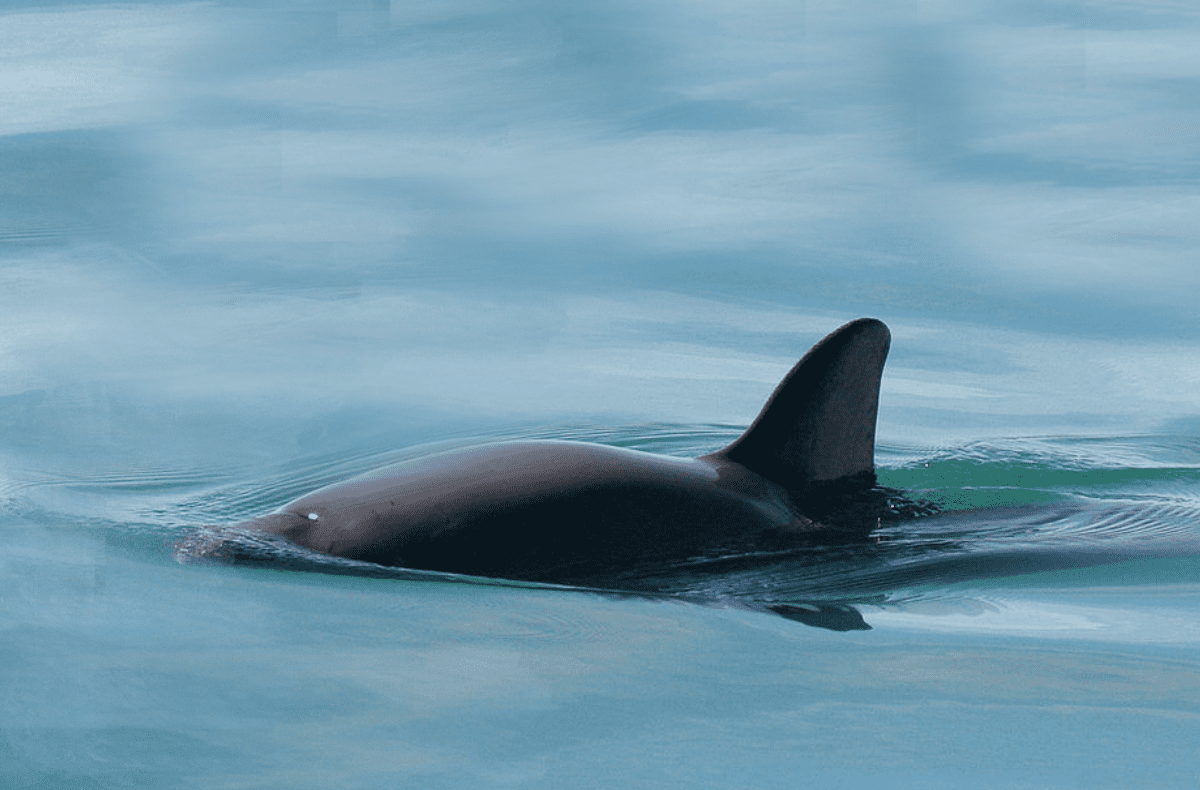
Image Remixed by Nikki Muller
Thanks to a concerted effort by criminals and a criminal lack of effort from the rest of us, human beings are on the cusp of eradicating another unique and beautiful species. The vaquita—a reclusive, highly intelligent and unusually resilient porpoise that evolved somewhere between 2 and 5 million years ago—may be extinct by the end of 2023. I invite you to meet the vaquita and learn a little bit about it, before it’s too late.
“They’re chunky little fellows,” said Dr. Barbara Taylor, a former Senior Scientist at NOAA and one of the world’s leading vaquita experts. Vaquita means “little cow” in Spanish, an appropriate name for a plump, diminutive aquatic mammal. Adult vaquitas are about five feet long, making them the smallest members of a family that includes larger porpoises, dolphins, and the biggest creatures on Earth, whales.
Observers estimate there are now fewer than a dozen vaquitas remaining in the small corner of the Sea of Cortez that they call home. Even when vaquita numbered in the hundreds, many of the humans who live closest to them had never seen one and considered them mythical creatures. But vaquitas are real, and they have very good cause to avoid human beings.
The species is on the brink of extinction, not because it is in any way valuable, but because it happens to share a small and teeming patch of sea with a fish called the totoaba. Both species appear to have been doing just fine until globalization made it possible for catch from the Sea of Cortez to end up in China, where the totoaba’s swim bladder is a delicacy. A lucrative swim-bladder trade blossomed, and continues to blossom despite having been outlawed in 1975. Along with sea turtles and many other inhabitants of a sea that Jacques Cousteau once referred to as “the world’s aquarium,” vaquitas get trapped in the illegal gill nets used to catch totoaba, making it impossible for them to surface and breathe.
In short, the vaquita may be just months away from going extinct, not because humans prize it in any way, but because we prize the totoaba’s swim bladder more.
It may not surprise you to learn that the Mexican government has allowed this illegal activity to thrive. The story of how the totoaba trade became wrapped up in the drug trade, militarizing the conflict over vaquita conservation and deeply implicating the Mexican government, is a fascinating one—something the documentary Sea of Shadows does an excellent job revealing, for those interested in learning more.
Mexico has a long history of dodging this issue, focusing less on saving the vaquita than on finding proof that it is already a lost cause. For years, Mexican officials have argued that any attempt to revive the species would only result in malformed, inbred porpoises. According to a recent UCLA study, the opposite is true.
“The key component of it is that this population has been pretty small and isolated over the long term, over tens, if not hundreds of thousands of years,” said Chris Kyriazis, a researcher at UCLA who co-authored a recent study suggesting the vaquita could bounce back better than anyone had expected. “You can think of it as a low level of inbreeding throughout the history of the organism that helps weed out those recessive harmful mutations” that would make reviving the population impossible.
This leaves vaquitas highly capable of bouncing back—if humans would simply stop killing them.
Barb Taylor can rattle off a list of reasons that the Mexican government has offered for giving up on the porpoise, and has a rebuttal to every one. On her numerous trips to the Sea of Cortez, Taylor has observed the vaquita to be nimble in more ways than one.
“They’re a very uniquely adapted porpoise,” Taylor said, highlighting the vaquita’s ability to adjust to changing water temperatures. The Sea of Cortez is far warmer than most cetacean habitats, which may account for why the vaquita has evolved into the smallest porpoise in the world (and the best at shedding heat). But the vaquita must also deal with cold waters in winter.
“They have to be able to stack on blubber,” Taylor said, adding that they are, by necessity, not picky about food. “Like other porpoises, they eat just about anything that fits in their mouth.”
It’s difficult to see anything in the vaquita’s teeming and nutrient-rich home waters, but vaquitas can echolocate well enough not only to hunt, but even to avoid nets. Taylor laughed as she spoke of a recent Mexican proposal to make the illegal nets more visible to vaquitas, noting that visibility was not the problem. Her research has demonstrated that vaquitas can detect potential threats like nets, use echolocation to examine them, and swim around them. She’s seen vaquitas identify and avoid threats firsthand.
“The mothers and calves immediately came together and ran from the vessels that were trying to set nets up to capture them,” she said. “So they started porpoising all the way out of the water, and you could see how bonded the mothers and calves were.”
The problem is that it only takes one misstep (if that term can be applied to a flippered being) for a vaquita to lose its life in a net. And there are very few vaquita lives left to spare. The World Wildlife Foundation estimates that thousands of species vanish forever each year, and they are all important, not just the cute ones. Still, losing an animal like the vaquita—a highly intelligent mammal capable of complex communication and with an observable capacity to love one another—will be a palpably sad moment for any human with a conscience, and we should embrace the feelings stirred up by these shy, chunky little cetaceans.
You and I, as well as roughly ten remaining vaquita porpoises, are witnesses to the sixth great extinction in our planet’s history, the first one caused entirely by a single species. If there is any hope for recovery from this calamity, humans must think deeply about what we value, what we don’t, and what we’re losing. The last vaquita porpoise may drown in a net this year, and its cause of death will be human indifference. We cannot respond to this tragedy with more of the same.



